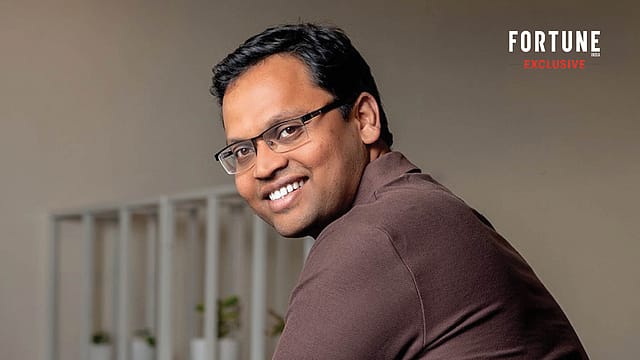India’s sovereign AI will rival the world’s best: Sarvam AI cofounder Pratyush Kumar
ADVERTISEMENT

Sarvam AI is racing to build India’s first sovereign foundational AI model—an ambitious, 70-billion-parameter system designed from scratch to be multilingual, multimodal, and globally competitive. The target is audacious: deliver a competitive large language model within six months.
Selected under the ₹10,000-crore IndiaAI Mission, the Bengaluru-based startup, which is housed under the legal entity Axonwise Private Limited, will create a model that can power advanced reasoning, coding, and real-world use cases even as it stays deeply rooted in India’s linguistic and cultural landscape.
In fact, the road to Sarvam’s selection wasn’t easy. The government had received over 400 proposals when it invited applications earlier this year to support the development of foundational AI models tailored for India. Sarvam was chosen after intense evaluation rounds. "It was a multi, multi-step process. Multiple evaluations, rigorous evaluations with experts," says co-founder Pratyush Kumar in an exclusive interaction with Fortune India.
To train its sovereign model, Sarvam will have exclusive access to 4,096 cutting-edge Nvidia H100 GPUs from the IndiaAI compute cluster which is powered by 10,000GPUs—including top-tier H100, H200, and MI200/300 units. In fact, the IndiaAI compute facility is set to expand further, with another 8,693 GPUs coming online soon. With this, India will be home to one of the most formidable AI infrastructures in the world.
While details of government support are still being finalised—including possibilities of grants, incentives, and even a potential equity investment—Sarvam plans to invest aggressively from its own resources to ensure the project’s success. "We'll both hire, and we will also invest additionally from Sarvam, to make this model come through," reveals Kumar. The startup has thus far raised $41 million from marquee investors including Lightspeed Venture Partners, Khosla Ventures, and Peak XV Partners.
A new frontier
For cofounders Vivek Raghavan and Pratyush Kumar, both veterans of AI4Bharat at IIT-Madras, Sarvam’s mission is clear: to craft an AI that’s sovereign not just in name but in governance, training, and accessibility. While many global foundational models prioritise English or major world languages, Sarvam will be truly Indian. "We’re building it for all 22 scheduled languages and that is one of our key differentiations that we want to focus on," says Kumar.
The model, however, would not merely serve public sector needs but have broad commercial viability too. It is being designed as a powerhouse: multilingual, multimodal, capable of advanced reasoning, complex problem-solving, coding, and mathematical computations. "It’s not a compromise model," reveals Kumar.
Ashwini Vaishnaw, Union Minister for Electronics & Information Technology, Railways, and Information & Broadcasting, mentioned the model will have 70 billion parameters and many innovations in programming as well as engineering. “It can compete with some of the best in the world," Vaishnaw said at an event on Saturday.
At every stage of training, every dataset, and every parameter setting will be fully under Indian oversight. "We will build it out in a governance structure, which is such that this model could be fully trusted and used in multiple public sector activities," says Kumar adding, “At the same time, it will be generically capable—to create economic value beyond just government applications.”
Importantly, a core principle guiding the sovereign AI development is an uncompromising commitment to citizen privacy. Kumar made it clear that while the model may leverage public datasets to enrich its knowledge, no personal or sensitive information—such as Aadhaar or private citizen data—will be used.
World-class AI at Indian costs
Affordability is another cornerstone of the mission. "When the model is launched, it'll be widely available at an affordable price," says Kumar, highlighting that Sarvam’s engineering innovations will further optimise costs for researchers, startups, and public sector institutions.
Not surprising that comparisons with other frontier AI models, such as China's DeepSeek, are inevitable. Kumar, however, is candid. "It's just not to compare against them. We'll do our thing. I don't know what they have done. Nothing is publicised in the papers. They don't mention what data sets have been used and so on," quips Kumar. Instead, Sarvam’s goal is clear—to build a competitive model. “We will build a model that will be competitive with global providers," says Kumar.
While the six-month timeline looks stiff, Kumar is confident that LLM will be a robust model. "We'll release a fully functioning system. The ecosystem can build on top of it," says Kumar. Pulling it off would not just be a technical feat—it could well mark the breakout moment India has long been waiting for in the hyper-competitive global AI race.